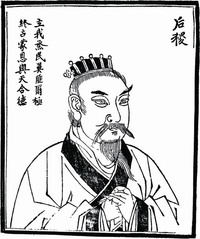
Back Hou Ji BS Houji German Houji French Hou Ji Croatian Hou-csi Hungarian Houji Italian 后稷 Japanese 후직 Korean Хоу-цзи Russian Hậu Tắc Vietnamese
Hou Ji | |
|---|---|
 Hou ji | |
| Other names | Qi |
| Children | Buzhu |
| Parent(s) | Emperor Ku Jiang Yuan |
Hou Ji (or Houji; Chinese: 后稷; pinyin: Hòu Jì; Wade–Giles: Hou Chi) was a legendary Chinese culture hero credited with introducing millet to humanity during the time of the Xia dynasty.[1] Millet was the original staple grain of northern China, prior to the introduction of wheat. His name translates as Lord of Millet and was a title granted to him by Emperor Shun, according to Records of the Grand Historian.[2][3] Houji was credited with developing the philosophy of Agriculturalism and with service during the Great Flood in the reign of Yao; he was also claimed as an ancestor of the Ji clan that became the ruling family of the Zhou dynasty[4] or a founder of the Zhou.[5]
After the Zhou dynasty, ancient Chinese historians, folklorists, and religious practitioners had a variety of opinions on Hou Ji,[6] including the opinion that he became deified as the god Shennong after his death.[5]
- ^ "Hou Ji", China culture, 2008-02-01.
- ^ Shiji, "Annals of the Five Emperors" quote: "舜曰:「棄,黎民始饑,汝后稷播時百穀。」translation: "[Emperor] Shun said, 'Qi, the black-haired people begin to be famished. Do you, Prince Millet, sow in their seasons the various kinds of grain.'"
- ^ Shiji "Annals of Zhou" quote: "帝舜曰:「棄,黎民始饑,爾后稷播時百穀。」"
- ^ The Book of Chinese Poetry: Being the Collection of Ballads, Sagas, Hymns, and Other Pieces Known as the Shih Ching; Or, Classic of Poetry. K. Paul, Trench, Trübner. 1891. pp. 9–.
- ^ a b Asim, Ina (2007). "Keynotes 2". University of Oregon. Retrieved 2023-07-18.
- ^ Scarpari, Maurizio (2006). Ancient China: Chinese Civilization from the Origins to the Tang Dynasty. Translated by Milan, A.B.A. New York: Barnes & Noble. p. 28. ISBN 978-0-7607-8379-5.
© MMXXIII Rich X Search. We shall prevail. All rights reserved. Rich X Search